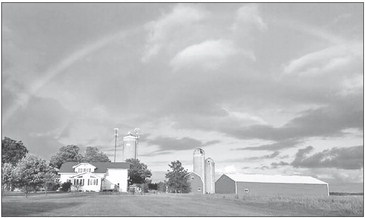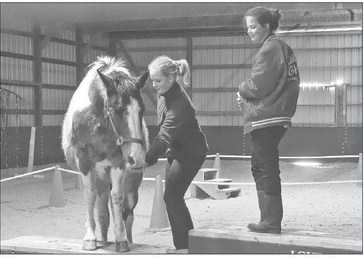Faith, trust and a little sawdust


Equine therapy program helps young people heal
The warm spring sunshine beats down on a sprawling 38-acre farm property just north of Marshfield, the soybean fields punctuated by a sturdy red barn, three silos, a pole shed, a granary and an old – yet well-maintained – two-story farmhouse. Roan, black and tricolor horses cluster together in a wooden pen connected to the barn. A plump cat sits sunning itself on the deck, watching the world pass by. Laughter and voices echo from the hayloft.
At first glance, it looks like any of the other farms dotting the rural countryside. But its inhabitants are unique, and so is the work they do.
At Merciful Heart of Jesus Farm, two religious sisters live out their days simply, aiming to demonstrate God’s mercy and bring about reconciliation in the lives of all who visit, whether that reconciliation is with oneself, others or God.
The sisters of the Franciscan Congregation of Divine Mercy, as they’re called, carry out their mission through prayer and sacrifice, spiritual and formational classes and individual mentoring sessions, and with the help of some special agents of reconciliation — four-legged ones, to be precise. The sisters offer equine therapy to individuals dealing with various woundings or traumas, whether emotional, relational or spiritual. Primarily children and teenagers work with the horses, spending a few hours at the farm weekly.
“The horses seem to be drawing the children,” said Sister Maria Lucia, who lives on the farm.
Sister Lucia and the foundress of the community, Mother Mary Veronica, see horse therapy as a powerful way for human beings to let down some of their walls and more easily give and receive love.
“Horses are incredible for therapy. Although humans can regulate a horse, the horse tends to regulate the human. The horse is like a mirror — it shows you what’s inside of you,” said Mother Veronica.
Most of the horses on the farm are mustangs brought in from western states like California, Nevada or Utah; and most come from bad situations like abuse or neglect. The horses have to gradually learn how to trust people. As the horses heal, so do the people who are training them.
The sisters emphasize positive reinforcement training and allowing the horse to choose to take an action, rather than being forced to do so. The animal’s threshold is respected and it is rewarded for small, attainable steps toward the desired behavior.
“God respects our free will. God rewards the smallest good effort. God continues to love us whether we are good or bad. Training becomes a cooperative effort where both parties participate with and listen to each other. It is not about dominance or forced obedience. It is about freedom,” wrote Mother Veronica in a brochure.
The sisters offer girls and boys horse classes in which they learn how to take care of horses and how to train them through positive reinforcement training. The horse is rewarded with hay cubes for taking the desired action.
For example, students might train a horse to step over a platform. They use shaping, which is the act of reinforcing small steps that progressively lead towards an end goal. A small step could be something as simple as the horse shifting its weight or turning its head that indicates it’s moving toward the desired behavior. Those little steps are rewarded and gradually the horse is encouraged to step further out of its comfort zone.
“We’re not luring; we’re not forcing. It’s only when the horse makes a choice,” said Mother Veronica. “We can’t force a change in emotions but we can make the desired outcome more appealing… When you force an animal to do something, there are repercussions, like learned helplessness. When it knows it’s safe, the animal will feel free. It’s changing a fear-based relationship to a lovedbased relationship.”
One of the horses being trained on the day I visited had already been ridden, but it was being re-trained to trust humans and not respond out of fear of punishment.
“We could ride the horse, but we’d have to force it. It’s not loving to do that. We want to honor the horse’s emotions. She was trained with fear. A lot of horses have fear, but it’s never expressed. When you start listening to what they’re telling you, they feel safe to express that fear and gradually overcome it. They become happier, looser, more relaxed and free when riding.”
The same could be said about the humans who work with the horses. Studies have shown that working with animals has a natural calming effect on humans and can help reduce one’s heart rate; and lower stress and anxiety. The trainers are encouraged to breathe slowly and deeply when working with the horses, as the more relaxed the trainer is, the more relaxed the horse will be.
The sisters say the animal therapy has also helped to boost self-esteem and confidence, especially in the young ladies who participate. The horse training gives them the opportunity to learn a new skill, be a leader and take responsibility for an animal’s wellbeing. Many times a special connection is formed between horse and rider, as there is a comfortability that comes with knowing a horse will accept them as they are, without judgment.
As an example, “We have one teenage girl coming to us who has been through severe trauma. She had to write a paper for an English class on the day that changed her life, and she told me she wrote about the day she met one of our horses,” said Sister Lucia. “This horse is a very fearful horse, the most fearful horse we’ve had… He’s so timid, but he has an empathy for people and I think a very high sensitivity to people who have been through trauma and difficult situations. So she’ll just go and we’ll give her a little time where she can just be with him. She can just kind of rub him. I think sometimes she’ll talk with him. When she was here last, she was just rubbing him and he would come up and lick her. It was just so sweet and she’s made comments about how the animals make you feel important and the animals make you feel special. And to know that she’s getting something there with the animals — there’s something special about that.”
There are many such stories, said Sister Lucia, as well as stories of marriages being restored through the spiritual guidance couples receive from Mother Veronica. While not as dramatic of an impact, the sisters have also seen children positively impacted through spending time outdoors and interacting with animals. Children ages 9 and under enjoy a “Farm Fun with the Sisters” event in which they visit the horses, play games, make crafts, sing songs and learn about their faith.
Foundress/Farm History
Mother Veronica thought that when she became a religious sister, that would be the end of her work with animals, but considering how involved she’s been with animals throughout her life, it’s not surprising that that aspect found its way into her ministry. “Always it becomes a call from God,” said Mother Veronica. “It has to be unique. The Holy Spirit inspires a gift, or charism, for us to share with others.”
Mother Veronica was born in Minnesota and as a youth did many animalrelated activities including walking and training neighborhood dogs as well as her own, horseback riding, working at the veterinarian’s and teaching pet care classes. She went to college at the University of Minnesota-Waseca for light horse management. After college, she worked on her parents’ horse farm as trainer, riding instructor and barn manager.
At the age of 26, she accepted the call to be a religious sister and join a Divine Mercy Community. She spent the next five-and-a-half years working as a riding instructor while gradually selling most of the horses and farm.
In 2000, Mother Veronica joined a Poor Clare Community. She continued working with animals at the monastery, among other duties such as work in the kitchen, on the liturgy and in the altar bread room. In 2016, she moved to Marshfield, as did Sister Lucia. She also met with Bishop William P. Callahan of the Diocese of La Crosse and received permission to begin a Divine Mercy Community. She spent time at St. Anthony Spirituality Center in Marathon City and met contacts who were interested in helping her start a religious community. The following year, she moved into the empty rectory adjoining Corpus Christi Church in Bakerville.
In the summer of 2018, Sister Lucia came to live with Mother Veronica. On March 27, 2019, the Franciscan Association of Divine Mercy was approved as a 501(c)(3) nonprofit by the U.S. federal government and that summer, Mother Veronica and Sister Lucia moved onto the farm.
In the years since, Mother Veronica has offered several classes and spiritual direction for individuals and couples. During COVID, classes were limited to online, but in 2021, in-person classes gradually resumed. Also that year, a horse therapy arena was installed and the horse and dog therapy programs began.
Last year, the sisters began the riding aspect of their horse program and expanded the children’s programming. Mother Veronica became a therapy dog team instructor through the Therapy Animals Unleashed program and the first therapy dog was trained, evaluated and certified. A new tack room and a bathroom were completed. A 41-feet by 11-feet heated multipurpose room is currently under construction in the barn.
The sisters do not charge for any of their services, so they appreciate any donations to continue their ministry. They also are always in need of volunteers for yard work, carpentry, fencing and fieldwork, grounds maintenance, cleaning, helping with special events, technological or computer help, shopping, offering rides as needed, or other jobs around the farm.
For more information or to volunteer, reach out to fcofdivinemercy.org or call 715-451-2395.

Ava (center) and Nora work to train Lucy the horse at Merciful Heart of Jesus Farm near Marshfield.
